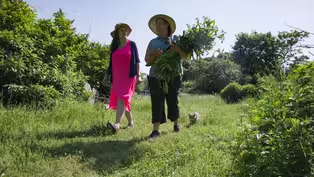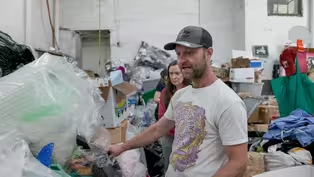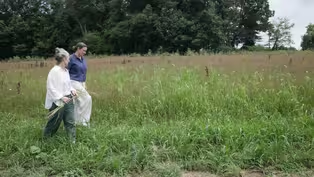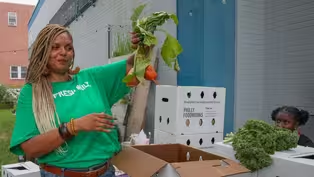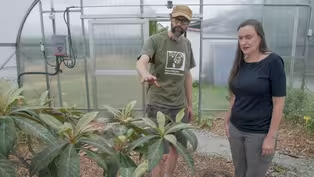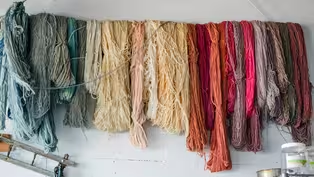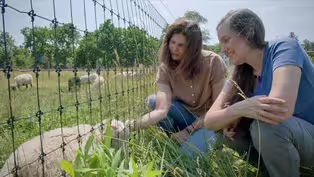WHYY Series
Using chemistry to recycle clothes
Special | 1m 32sVideo has Closed Captions
Less than one percent of our clothes get recycled.
Less than one percent of our clothes get recycled. Instead, they get burned or dumped in a landfill, contributing to both plastic and climate pollution. We visit a lab at the University of Delaware in Newark, where researchers say they’ve figured out a chemical solution to turn used clothing into its component parts.
Problems playing video? | Closed Captioning Feedback
Problems playing video? | Closed Captioning Feedback
WHYY Series is a local public television program presented by WHYY
WHYY Series
Using chemistry to recycle clothes
Special | 1m 32sVideo has Closed Captions
Less than one percent of our clothes get recycled. Instead, they get burned or dumped in a landfill, contributing to both plastic and climate pollution. We visit a lab at the University of Delaware in Newark, where researchers say they’ve figured out a chemical solution to turn used clothing into its component parts.
Problems playing video? | Closed Captioning Feedback
How to Watch WHYY Series
WHYY Series is available to stream on pbs.org and the free PBS App, available on iPhone, Apple TV, Android TV, Android smartphones, Amazon Fire TV, Amazon Fire Tablet, Roku, Samsung Smart TV, and Vizio.
Providing Support for PBS.org
Learn Moreabout PBS online sponsorshipMore from This Collection
In this video series, WHYY’s Senior Climate Reporter Susan Phillips profiles innovative people working locally to cool the earth, heal the planet and help neighbors thrive.
The simple act of planting native species
Video has Closed Captions
Jennie Love shows us the benefits of native plants at her flower farm in Northwest Philadelphia (1m 58s)
Video has Closed Captions
By re-using raw materials, we keep trash out of the landfill. (1m 35s)
How flax can slow down fashion
Video has Closed Captions
Fields of flax with their tiny blue flowers once thrived in rural Pennsylvania. (1m 57s)
How a plant-based diet can help the planet
Video has Closed Captions
Eat your vegetables! It’s a common refrain. (1m 43s)
Growing bananas in Philly? Preparing for a warming future
Video has Closed Captions
As the climate changes so do our growing seasons. (1m 57s)
Video has Closed Captions
Synthetic dyes pollute waterways across the globe. Many are petroleum based and their production hel (1m 32s)
A climate solution that keeps us warm and dry
Video has Closed Captions
Industrial farms damage waterways and contribute to climate change. (1m 34s)
Providing Support for PBS.org
Learn Moreabout PBS online sponsorshipLess than 1 percent of our clothing actually gets recycled The rest ends up in a landfill or it gets incinerated contributing to climate pollution but here at the University of Delaware in Newark researchers think they’ve found a solution I’m here with Erha Andini She’s a PhD student here at the University of Delaware and she’s the brains behind this new solution Erha, tell us why it’s so hard to recycle clothing right now Recycling clothes is very challenging because modern garments consist of different types of fibers all interlaced together and that makes separating them into their pure components very challenging So like for instance this shirt I have right now It’s got lots of components.
I’m not sure what they are But can we recycle this today through your process?
We can try I wanted to solve this problem mainly after learning that less than one percent of clothes are recycled back to clothes And I thought that’s very interesting because when you go to stores You’ll see on the tags they say made from recycled polyester but in reality, those came from plastic bottles So I’m watching my shirt getting broken down into its component parts which then will allow us to then reuse those fibers theoretically in new clothing, so that cuts our carbon emissions Yes Taking this process out of the lab and into the real world could mean keeping a lot of climate polluting clothes out of the waste stream

- News and Public Affairs

Top journalists deliver compelling original analysis of the hour's headlines.

- News and Public Affairs

FRONTLINE is investigative journalism that questions, explains and changes our world.












Support for PBS provided by:
WHYY Series is a local public television program presented by WHYY
